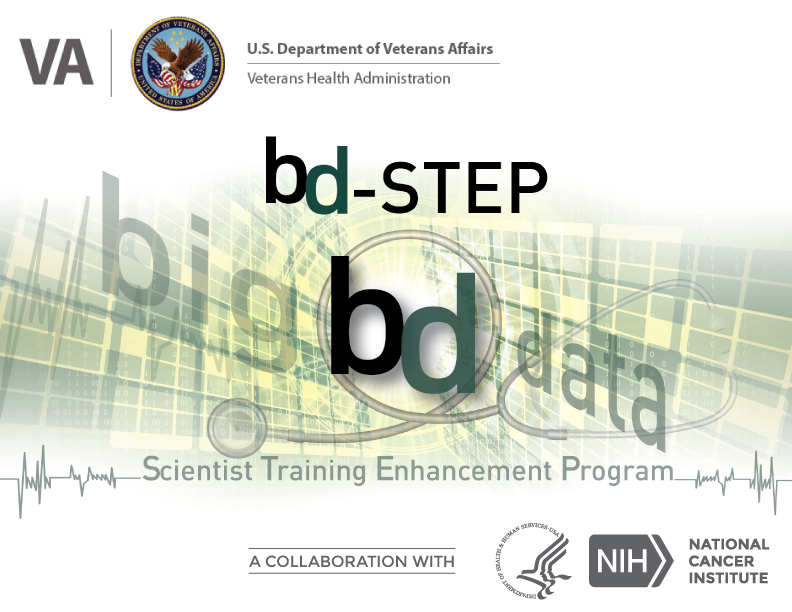Using health data to understand disease and wellness, as well as the best treatment and prevention options for patients, is critical for improving health care.
That’s why the Department of Veterans Affairs (VA) is partnering with the National Cancer Institute’s (NCI) Center for Strategic Scientific Initiatives and others to use “big data” to advance favorable outcomes in patient care.
What is “big data”? It’s a health care term used to describe complex and very large data sets that have evolved since the beginning of electronic health records. You may not know, but VA now has over one-billion data points available to assess Veteran health!
All of that information is incredibly useful for researchers and clinicians. But, it takes special training to understand how to use the data to advance health. That’s why VA and NIH are partnering in a pilot initiative called the Big Data Scientist Training Enhancement Program (BD-STEP).
Together, we will train a new generation of “hybrid” clinical data scientists. We’ll teach them how to use data sets, algorithms and models — to develop innovative solutions to improve health care.
Traditional data scientists are trained in disciplines such as computer science and applications, modeling, statistics, analytics and math. As health care increasingly uses big data, we need to be sure traditional data scientists understand health care operations as they relate to the data they evaluate. BD-STEP hopes to place these “hybrid” clinical data scientists in medical centers to work closely with VA clinicians.
Can redefine care delivery
“Potentially, BD-STEP can redefine care delivery by training clinical data scientists to understand and interpret the rapidly increasing amount of data generated in clinical settings and to utilize the data to directly impact decisions in clinical care,” said Under Secretary for Health Dr. David Shulkin.
“Our goal is to grow a trainee’s professional capacity to fully understand the mechanics of VA’s health care delivery system and to use data to enhance Veteran care.”
Six VA Medical Centers are participating in this pilot program: Boston, Mass.; Buffalo, N.Y.; Durham, N.C; Houston, Tex.; Palo Alto, Calif.; and Seattle, Wash. Each site is matched with one to two trainees from renowned academic institutions in the big data field.
Current projects include partnerships with Stanford University on “Longitudinal Medical Radiation Exposure and Cancer Risk,” Harvard University to look at the “Diversity in Epidemiological and Genetic Predictors of Onset and Progression of Myeloma,” and the University of Southern California on “Hepatocellular carcinoma (HCC) Prediction Models for Hepatitis C Patients.”
BD-STEP also supports Precision Medicine Initiative (PMI) – a new research effort by the White House to revolutionize how we improve health and treat disease.
BD-STEP is a first time collaborative between VA’s Employee Education System, Office of Academic Affiliations, and the Office of Research and Development to build a new program with National Cancer Institute. BD-STEP is an exciting new initiative to advance delivery of health care for the Veterans we serve.
For more information visit: https://www.va.gov/oaa/specialfellows/programs/sf_bdstep.asp?p=24

Topics in this story
More Stories
Veteran Byron Potier weighed almost 300 pounds and was tired and lethargic. He was the perfect candidate for gastric sleeve surgery.
How much do you know about VA care, benefits and services? Don’t miss out on what you've earned—check out the "2025 VA Federal Benefits Guide for Veterans, Dependents, Survivors, and Caregivers" handbook to learn more.
Feeling stressed? Your breath can help you relax and focus. Take 3 minutes to reset and prioritize your well being for this week's #LiveWholeHealth practice.







I have a very hard time getting to our vet. hospital..there are no direct srevives available for the 20 mile trip there. Why do not have some method of using my regular dr.and have him send a physical exam report to the v.a. it takes about 3 hours for the 42 mile roundtrip.is there any way to talk to a real person to explain my problem
I have tried five times to get this on the net and every time it tells me I need something. they tell my email address is invalid I have been trying to get information about how am I going get to my v.a. facility. I can not drive and have no way to get there. the 21 miles to get there would require four hours for two way trip. is there any way I could use my local doctor and have the results sent to the v.a. I rate 70% disability. sure hope the presidenitial candidates will full those promises